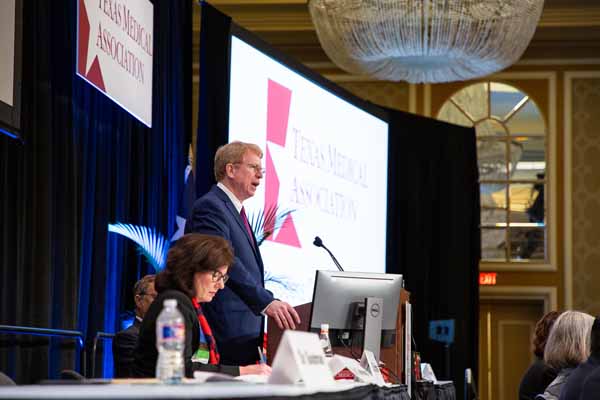
After becoming the Texas Medical Association’s 154th president Saturday, Austin colon and rectal surgeon David C. Fleeger, MD, told TMA’s House of Delegates that medicine must adapt to inevitable and necessary changes while steadfastly adhering to its timeless commitment to patients.
“Change can be good or bad, disruptive or transformational,” Dr. Fleeger said at TexMed 2019 in Dallas. “What really matters is how we respond to the inevitability of change.”
An avid and skilled photographer, Dr. Fleeger interspersed photos from his many travels to illustrate his message about adapting to change while holding firm to professional values. His long-standing involvement in organized medicine includes chair positions on TMA’s Committee on Physician Distribution and Health Care Access, and the Council on Practice Management Services, as well as vice-chair of TMA’s Board of Trustees.
He expressed concern that the medical profession is becoming “a mere trade, a technical skill, a line item on a spreadsheet,” and that physicians are increasingly becoming known as “providers.”
“Words matter,” Dr. Fleeger told the house. “We deserve to be called physicians – physicians who treat our patients. We should insist on it. But, in return, we must also act like professionals. Always. It is because we are professionals that we do not punch a time clock in the middle of patient care. It is because we are professionals that we do not charge three to four times what our peer across the street does for the same service. It is because we are professionals that we lead, supervise, educate, and monitor the other members of the health care team. They don’t know what we know. They can't do what we do.”
Some change is both inevitable and imperative, Dr. Fleeger reminded his colleagues. As the percentage of female physicians grows, for example, TMA must “provide value” to that growing segment of its membership, he said. He has high expectations that TMA’s newly created Women in Medicine Section will bring more female physicians into TMA leadership.
“I am a little embarrassed to say that only a third of the physicians recommended to me for council or committee appointment were female,” Dr. Fleeger said. “A little over 40% of my appointments will be female. Fifty percent of our leadership college is females. … You could ask me what changes our association should make to adapt to this trend, but personally I would prefer to turn to the physician on my right, the physician on my left, and ask her what she thinks we should do.”
Another growing swath of medicine’s membership Dr. Fleeger plans to focus on is the employed physician. Noting that more and more physicians have chosen that route, he announced he would appoint an Ad Hoc Committee on the Employed Physician. The committee will spend a year studying and making recommendations for how to improve TMA’s value to physicians who have chosen employment.
“They, too, aspire to these same timeless and unchanging core values, but their needs are different from the solo and small group physicians,” he said. “Our TMA must better define the employed physicians' needs and how we as an organization can provide them value for their dues dollars.”
Associations like TMA are how doctors maintain and preserve their profession, Dr. Fleeger said.
“Our response to change is and must be grounded in our timeless and unchanging core values: uncompromising and unconflicted regard for our patients’ benefit and best interest.
“Timeless,” he repeated, “and unchanging.”